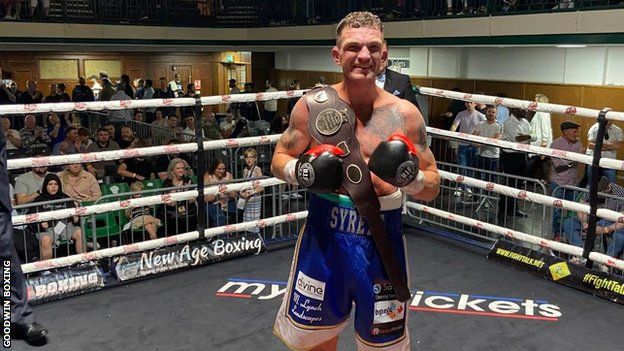Small Hall Spotlight: Skills don’t pay bills – tickets do in the world of small show boxing
- Published

Fighters like Lewis Syrett have to sell tickets to earn a place on the show
"This is a tough, tough business, so you've got to be straight with people."
More than one thousand fighters hold professional licences with the British Boxing Board of Control.
For the vast majority, TV appearances are a rarity and multi-million pound purses on pay-per-view shows a distant dream. Instead, they ply their trade in town halls, leisure centres, nightclubs and ice rinks.
From debutants boxing four rounders, to hopefuls in area title bouts, this is the world of the small hall - a world where champions are moulded, illusions are shattered, and the fight game's harsh realities are laid bare.
In contrast to the big names training full time, boxing at this level is usually a side gig and most fighters have day jobs - coaches, even managers and promoters too. Bedfordshire-based promotion and management company Goodwin Boxing was founded by Steve Goodwin, whose primary business is in financial services.
The company looks after a roster of 90 fighters, including current Southern Area middleweight champion Lewis Syrett. In the past they worked with names such as heavyweight contender Derek Chisora, former British light-heavyweight champion Frank Buglioni and WBO world flyweight titlist Nicola Adams.
"We get a bad press," Goodwin's director of operations, Kevin Campion, a former boxing coach, says, with a sigh. "We know that. Everyone thinks promoters are villains, that we're exploiting young fighters to make money. But to be honest, very few people understand how professional boxing actually works."
Goodwin hosts regular events at the York Hall in east London. It is a venue immersed in fighting folklore yet remains a quintessential small hall. Maximum capacity stands at 1,250, but shows are only half that number in attendance, with the upper tier closed and seating on the ground floor.
Even so, costs stack up.
"We start the night £20,000 down," Campion explains. "That's not just venue hire, that's board fees, referees, doctors, ambulances, security, hire of the ring, hire of an MC, maybe a DJ. There are so many auxiliary costs.
"That's the position we're in. Of course, the business needs to sustain itself and that 20 grand must be recouped. When we put a show on, we at least need to break even."
How that money is recouped is essentially the elephant in the room of professional boxing.
In the absence of TV revenues, which provide the largest income stream at big shows, small hall events are funded purely by ticket sales. With no casual, walk-up audience for local boxing, the responsibility for selling tickets rests squarely on the shoulders of fighters. Regardless of performances in the ring, careers live or die on this fact alone.
"We try to help as much as we can," Campion says.
"Obviously, we promote the show online and through posters and so on. We do also sell tickets directly from our website, but yes, every boxer has to get out there and earn their place on the card.
"We know it's the bane of everybody's life and if we could get rid of ticket sales tomorrow, we would, but in today's marketplace, there's no other way to make that 20 grand back."
Simply put, this means an ambitious boxer must also be a salesperson. Bums on seats matter more than talent. A fighter who can punt out 55 tickets to friends, family, and acquaintances, with a face value of £40 - £45 each, will raise just over £2,000.
This contributes towards the costs of the show, including the referee's wage, and their opponent's. A fighter who cannot generate this sort of money before each bout gets shut out, no matter how good they are.
York Hall in east London is a regular home for small hall boxing
"We know it's not fair," Campion says. "You can get talented kids who just aren't the right personality to sell, a bit shy perhaps.
"That's a shame and like anyone we're open to suggestions, but these days the only other way is for fighters to be financially backed. But that's a tiny minority, Olympic gold medallists maybe, who start their careers like that."
"We know how hard this is. Our boxers have jobs. They might have families, too. Then they've got to find time to train to a professional athlete level and on top of all that, sell tickets. It's a tough, tough, business.
"So, we thoroughly explain all this when they sign. We tell them the expectations. If we think they're unsuited, we advise them not to turn pro.
"That's why boxers view Goodwin as an ethical promoter. We ensure, 100% that our fighters go into this with their eyes open. That's all we can do."
Like many in the sport, Campion would love a return to the 1960s and 70s, when local, small-hall boxing shows would sell themselves and young fighters were not saddled with this burden.
Times have changed, however and the 'ticket deal' model, as it is known, is the only one perceived to currently work.
"At Goodwin we understand where we are in the scheme of things, but ultimately what we do is important," Campion explains. "The top of the sport can't exist in isolation. We give our boxers the platform they need, and we do our best for them.
"Of course, the small hall scene isn't perfect, but nothing ever is."
Related Topics
- Published16 October 2022